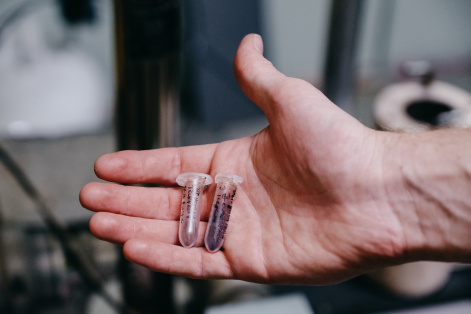The size matters: only large nanoparticles from bacteria can be used in medicine
14 October 2020 г.

Ferrihydrite is an important mineral involved in the life of living organisms, including humans. For example, the protein apoferritin in our liver is a particle of ferrihydride, which is "packed" in a shell of organic compounds. Certain types of bacteria can be used to synthesize natural ferrihydrite. The biocompatibility of the material makes it promising for medicine. However, for successful application, it is important to study in detail the properties of nanoparticles.
Physicists of the Federal Research Center KSC SB RAS together with colleagues from the Siberian Federal University discovered the dependence of the magnetic properties of ferrihydride on the size of nanoparticles and density of their core. Ferrihydrite has a core-shell structure, with the core is formed in particles larger than two nanometers, which is denser in structure than the shell.
Scientists isolated ferrihydrite particles several nanometers in size from the biomass of the bacteria Klebsiella oxytoca. As in the human body, such nanoparticles consist of a dense core in a protein shell. Remarkably, the shell minimizes magnetic interactions between the particles. This allowed physicists to focus on studying the features of the magnetism of iron atoms in the nuclei of individual nanoparticles.
In the study use was made of nanoparticles ranging in size from 1,5 and 3,5 nanometers. The scientists found magnetic properties to depend on the particle size. In the course of subsequent experiments, it was revealed that the difference was due to the particle nuclei, or rather, their presence. The solid core turned out to be formed only in nanoparticles larger than two nanometers, while small particles consist of a low density material and they have no core at all.
“The conditions for the formation of ferrihydrite significantly affect the physical properties of its nanoparticles, in particular, its crystallinity and interactions between individual particles. The magnetic properties, and thus the application, are highly dependent on the particle structure. The dense core provides nanoparticles with better magnetic properties and makes the material more suitable for application in medicine, for example, for the delivery of drugs or a point thermal effect on the foci of diseases in the body, ”comments on the results of the study Yuri Knyazev, Candidate of physical and mathematical sciences, researcher at the L.V. Kirensky Institute of Physics KSC SB RAS.
The research of the Krasnoyarsk scientists was supported by the Russian Foundation for Basic Research, Government of the Krasnoyarsk Region and Krasnoyarsk Regional Fund for the Support of Scientific and Technical Activities (project No. 19-42-240012).
Share:
